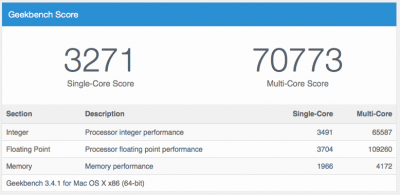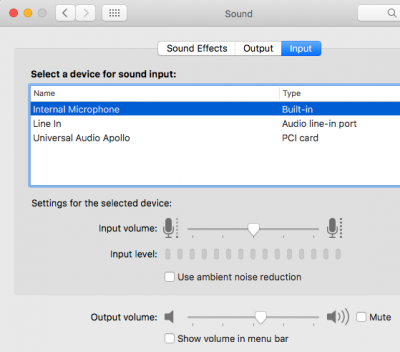- Joined
- Oct 31, 2013
- Messages
- 21
- Motherboard
- Supermicro X10-DAi
- CPU
- 1x Intel Xeon E5 2643 v4 3.4 GHz
- Graphics
- XFX Radeon RX 480 8 GB
- Mac
Happy to report some initial success @volition!
Same here, much thanks to you.
All the RAM registers and the RX 480 works in Windows 10.
...Then I realized my mistake was that I was trying to emulate @metacollin's end result, where as what I should have been doing was trying to emulate his journey to get there...
Seems that was my mistake too. Trying to get OS X installed with native power management in one go. As well as trying to do it with Sierra 10.12 GM (because of the RX 480). (It probably doesn't matter but I was using Clover at v3726 instead of v3751 too.)
Looks like this base install should work with a wide array of CPU's, GPU's and RAM for 10.11.6. I tried the same with 10.12 GM, but couldn't get it to work. I'll try again and come back with some more info on that.
I am now currently where metacollin was in this post. A working el capitan install, no CPU power management, working nvidia web driver, geekbench 3 score of 55k (I assume bios tweaks may explain the difference between my 55k and his 62k, I reverted bios and used minimum changes). Full networking works out of the box. Currently USB 3,0 is disabled. Full step-by-step instructions below.
Same here, except lack of GPU, which in addition to crappier CPU's and only half the RAM, maybe explains much lower scores.
Integer Processor integer performance 1814 24715
Floating Point Processor floating point performance 1884 34702
Memory Memory performance 1495 1870
Geekbench 3.3.4 for Mac OS X x86 (64-bit)
It's nice to hear your results were more in line with @metacollin's, even without all the deeper BIOS changes (disabling virtualization, power management, etc), messing with ACPI tables and Clover settings (patches, CPUFakeID's).
Oh, and no onboard audio (seems it's in system report, but not selectable as core audio in system preferences).
Also suddenly had the Thunderbolt AiC working. I disabled it when installing 10.11.6, then enabled it (hotplugged, enabled and in legacy mode), but couldn't get it to work. Then found some threads on here which lead me to install the Intel drivers in Windows 10. Rebooting the machine with the device on (Universal Audio Apollo Quad), it still didn't work. Then rebooted again, but changed SMBIOS to MacPro5,1 in Clover, and booted into OS X. Suddenly it worked. I've rebooted a few times since then, with SMBIOS being reverted to MacPro6,1, and it's still working. System report (still) says there's no Thunderbolt drivers loaded, and the Apollo is recognized as a PCI device under audio in systems report (common, from what I understand), but it works.
Btw, under PCI in systems report, it says "There was an error while gathering PCI device information". Not sure if that's significant.
Skipping ahead, what's next? By reading between the posts I believe the next steps metacollins took was to generate the SSDT (by "just making stuff up"). I believe this step needs to be done first BEFORE trying to use a fakecpuid of 0x0306F0/2 and removing NullCPUPowerManagement.kext from my build.
That's where I got seriously stuck. Using ssdtPRGen, there was no definition for these CPU's. I added that but didn't follow through after that. I'll try to do it, following this.
Also, would like to figure out why my windows geekbench is so low. Some possibilities: geekbench is reporting my memory weirdly "63.9 GB - 1 Mhz", and CPU-Z is reading the bus speed for the CPU is 100 Mhz when on mac os x reports it as 400 Mhz.
Both system report and Geekbench says 32.0 GB, 2400 MHz, DDR4 here in 10.11.6. Same with Windows 10 (task manager, CPU-Z, Speccy) except it reports all the RAM. I'll try Geekbench in Windows. The BIOS reports ~1867 MHz, which is max for these CPU's.
Used OsXAptioFix2Drv-64. Where/why is OsxAptioFixDrv-64 recommended though?- Check OsxAptioFix2Drv-64 to CLOVER/kexts/10.11/ (not 100% OsxAptioFix2Drv-64 is required instead of recommended OsxAptioFixDrv-64).
Confirmed!
Tried without too, so can confirm this as well.Once I got here, this got me past the +++++++++++++++++. I then experienced a hang on mbinit line, which prompted the following supermicro BIOS change.
For supermicro bios:
Under the BIOS on your machine, disable USB 3.0 (see this post)
...I then got the GPU working by...
Sounds great. All I can see is warped aspect ratio, lag and most of the screen flickering white each time I type a letter.
Thanks again for adding a step-by-step. Saved me a lot of time and frustration!
Attachments
Last edited:








